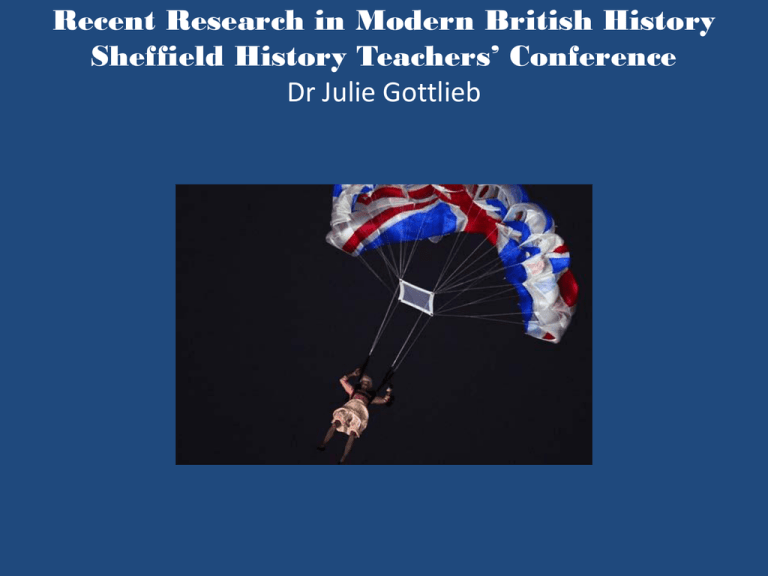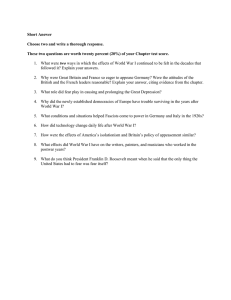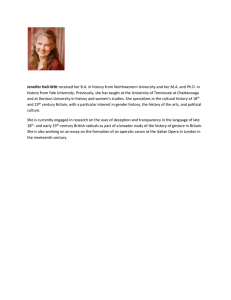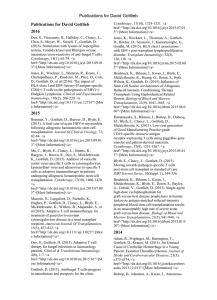Recent Research in Modern British History Sheffield History Teachers’ Conference
advertisement

Recent Research in Modern British History Sheffield History Teachers’ Conference Dr Julie Gottlieb Dr Julie V. Gottlieb • Cultural and Gender Historian of Politics Opening up new perspectives in the following ways: • Gender and women’s history of political extremism. J.V. Gottlieb, Feminine Fascism: Women in Britain’s Fascist Movement, 19231945 (2000) • What happened after the vote was won. J.V. Gottlieb and R. Toye (eds.), The Aftermath of Suffrage (2013) • A gender history of appeasement– from “Guilty Men” (‘Cato’, 1940) to J.V. Gottlieb, ‘Guilty Women, Foreign Policy and Appeasement in Interwar Britain (forthcoming, 2015) Central Themes of the Module • Impact of industrialisation • Transition to mass democracy • Changing social relationships – significance of gender, ethnicity, class • Cultural shifts – role of religion, new forms of communication, youth, standards of behaviour and morality • Britain as an imperial power, and the legacies of that history. How did Britain become “Top Nation”? 1066 and All That (published in 1930) The British Empire in 1886 PERIODIZATION: TURN OF CENTURY Noel Coward’s Cavalcade, a story of patriotism, pacifism and the erosion of social classes in post-Victorian England, covering the period from New Year’s Eve, 1899 to the same date in 1932. (film 1933) Lyrics to Noel Coward’s The Stately Homes Of England (1938) : Lord Elderly, Lord Borrowmere, Lord Sickert and Lord Camp. With every virtue, every grace, Ah, what avails the sceptred race. Here you see the four of us, And there are so many more of usEldest sons That must succeed. We know how Caesar conquered Gaul, And how to whack a cricket ball; Apart from this, our education Lacks co-ordination. Though we're young, And tentative, And rather rip-representative Scions of a noble breed, We are the products of those homes, Serene and stately, That only lately, Seem to have run to seed. The stately homes of England How beautiful they stand, To prove the upper classes Have still the upper hand. Though the fact that they have to be rebuilt, And frequently mortgaged to the hilt Is inclined to take the gilt Off the gingerbread, And certainly damps the fun Of the eldest sonBut still, we won't be beaten, We'll scrimp and scrape and save. The playing fields of Eton Have made us frightfully brave. And though if the Van Dycks have to go And we pawn the Bechstein Grand, We'll stand By the stately homes of England. New Year’s Eve, 1999. Cool Britannia on display at the Millennium Dome (or not?) Olympic Opening Ceremony (Danny Boyle) and Representations of Britishness and National Identity An Even Cooler Britannia! London Bridge on the Rise Olympic Opening Ceremony: The Suffragettes “This is for everyone”: Has Britain been transformed? The shift in the way we define periods in British history from monarch-identified to defined by social, economic and political leifmotifs “King Edward’s new policy of peace was very successful and culminated in the Great War to End War. This pacific and inevitable struggle was undertaken in the reign of His Good and memorable Majesty King George V and it was the cause of nowadays and the end of History.” (Chapter LXI, 1066 and All That) Britain in the ‘Roaring Twenties’ Characterization of the 1970s as a decade of economic crisis, fuel shortages, no garbage collection, punk music etc. The First Industrial Nation… The Political Nation Being British Empire and Commonwealth Changing Lives of Men & Women Heritage The Production of Modern British History Transformation? • Change – but also, what makes things change? • Should we focus on continuities rather than transformations? – relative stability in Britain compared with other countries: in 19th and 20th centuries avoided revolution, invasion, military defeat ... – Cf. France: revolutions (1789, 1830, 1848); shifts between republic, monarchy, new constitutions; military defeat (1870 and 1940); occupation (194044).




